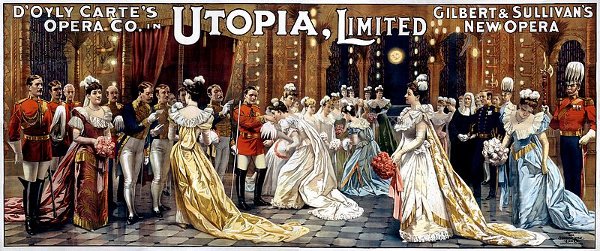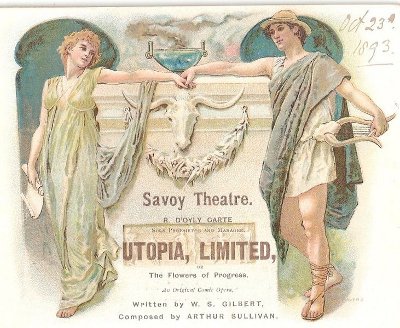Utopia Ltd Synopsis
Utopia Ltd History

Utopia Limited or The Flowers of Progress, is a Savoy Opera, with music by Sir Arthur Sullivan and libretto by W. S. Gilbert. It was the second-to-last of Gilbert and Sullivan’s fourteen collaborations, premiering on 7 October 1893 for a run of 245 performances. Although it did not achieve the success of their earlier productions, the opera was profitable.
Gilbert’s libretto satirises limited liability companies, and particularly the idea that a bankrupt company could leave creditors unpaid without any liability on the part of its owners. It also lampoons the “Stock Company Act” by imagining the absurd convergence of natural persons (or sovereign nations) with legal commercial entities under the limited companies laws. In addition, it mocks the conceits of the late 19th-century British Empire and several of the nation’s beloved institutions. In mocking the adoption by a “barbaric” country of the cultural values of an “advanced” nation, it takes a tilt at the cultural aspects of imperialism. The libretto was criticised as too long and rambling by the critics and later commentators, and several subplots introduced in Act I are never resolved.
Utopia is performed much less frequently than most other Gilbert and Sullivan operas. It can be expensive to produce, requiring a large principal cast and two costumes (“native” and “drawing room”) for most of the performers. The subject-matter and characters, including the specific government offices, are obscure for modern audiences, although its themes of corporatisation of public institutions and scandal in the British Royal family are evergreen. And although it contains some fine music, it perhaps has less than Sullivan’s usual quota of unforgettable tunes. Still, Utopia has its fans. George Bernard Shaw wrote in his highly favourable October 1893 review of the show in The World, “I enjoyed the score of Utopia more than that of any of the previous Savoy operas.”
Source: Wikipedia
Utopia Ltd Synopsis
Act 1
 On the fictional South Pacific island of Utopia, the monarch, King Paramount, has sent his eldest daughter, Princess Zara, to Girton College in England. He hopes that her training there will contribute to his plan to civilise his people. The Public Exploder, Tarara, disturbs the languor of the Utopian maidens (“In lazy languor, motionless”) to remind them of his duty to blow up the King if the two “Wise Men”, Scaphio and Phantis, order him to do so. The Wise Men appear, heralded by the chorus (“O make way for the Wise Men”) and note that their duty is to spy upon the King to prevent “rascality” (“In every mental lore”). Phantis proclaims his love for the Princess Zara, and Scaphio promises to help him win her (“Let all your doubts take wing”).
On the fictional South Pacific island of Utopia, the monarch, King Paramount, has sent his eldest daughter, Princess Zara, to Girton College in England. He hopes that her training there will contribute to his plan to civilise his people. The Public Exploder, Tarara, disturbs the languor of the Utopian maidens (“In lazy languor, motionless”) to remind them of his duty to blow up the King if the two “Wise Men”, Scaphio and Phantis, order him to do so. The Wise Men appear, heralded by the chorus (“O make way for the Wise Men”) and note that their duty is to spy upon the King to prevent “rascality” (“In every mental lore”). Phantis proclaims his love for the Princess Zara, and Scaphio promises to help him win her (“Let all your doubts take wing”).
The king arrives (“A King of autocratic power we”) and presents his two younger daughters, Nekaya and Kalyba, as models of English-style deportment (“Although of native maids the cream”). Their English governess, Lady Sophy, explains how young ladies should behave when approached by amorous gentlemen (“Bold-faced ranger”). The king joins the two Wise Men, commenting that life is a farce (“First you’re born”). The king is quite upset about the Wise Men’s power over him: he is unable to marry the Lady Sophy because of self-mocking articles that Scaphio and Phantis have forced him to write and publish in the newspaper under a pseudonym. He hopes that neither Sophy nor Zara will see the pieces, although he feels they are witty and well-written. Lady Sophy discovers the articles to her horror (“Subjected to your heavenly gaze”).
Princess Zara now returns to Utopia with six British gentlemen (the “Flowers of Progress”) in tow (“Oh, maiden rich in Girton lore”). She has become romantically involved with one of them, Captain Fitzbattleaxe (“Ah! gallant soldier”). Scaphio and Phantis, seeing her, are both smitten with love for the princess and argue jealously, finally agreeing to duel one another for her hand. Fitzbattleaxe comes up with a clever way to stall the Wise Men, by saying that, in England, two rivals must entrust the lady at the centre of a controversy to an officer of household cavalry “as stakeholder” until the argument is resolved (“It’s understood, I think”). Thus, he and Zara can remain together.
Soon, the Utopians assemble, and Zara introduces the Flowers of Progress one by one – Fitzbattleaxe (of the army), Sir Bailey Barre (Q.C. and MP), Lord Dramaleigh (a Lord Chamberlain), Mr. Blushington (of the county council), Mr. Goldbury (a company promoter) and Captain Corcoran (of the navy – a joking reference to the character from Gilbert and Sullivan’s early popular opera, H.M.S. Pinafore). The Utopian people are duly impressed, and they listen as each of the Flowers of Progress gives a piece of advice about how to improve the country. Mr. Goldbury explains, at some length, the British limited liability companies law (“Some seven men form an association”). The King decides to transform his entire country into a limited liability corporation – an innovation that even England herself has not yet accepted. Everyone but Scaphio, Phantis and Tarara is enthusiastic.
Act 2
Fitzbattleaxe is concerned that the fervour of his love has affected his singing voice (“A tenor, all singers above”). He and Zara share a tender scene (“Words of love too loudly spoken”). Utopia has transformed itself into a “more perfect” replica of Britain – it has built an army, a navy, and courts, purified its literature and drama, and wholeheartedly adopted Mr. Goldbury’s proposal, so that every person now is a limited liability entity.
The king and the Flowers of Progress exult in their success (“Society has quite forsaken”), and the people, pleased with English fashions and customs, sing of the country’s newfound glory (“Eagle high in cloudland soaring”). Scaphio and Phantis are furious because the change poses a threat to their power (“With fury deep we burn”). They demand that Paramount revoke the changes, and when he refuses, they remind him of their power over his life (“If you think that when banded in unity”). But the King points out that they cannot blow up a limited company. Scaphio and Phantis plot with Tarara on how to reverse the course of events and retire (“With wily brain”).
The younger princesses, Nekaya and Kalyba, meet with Mr. Goldbury and Lord Dramaleigh, who explain that English girls are not so demure and are instead hearty and fun-loving (“A wonderful joy our eyes to bless”). The princesses are pleased at the prospect of abandoning some of the “musty, fusty rules” that they have been living under (“Then I may sing and play?”). Meanwhile, Lady Sophy bemoans Paramount’s flaw that prevents her loving him (“When but a maid of fifteen year”). The King, his dignity rediscovered, approaches Lady Sophy and tells her the truth about the articles written about him, and she now happily agrees to marry him (“Oh, rapture unrestrained”).
Scaphio and Phantis, however, have succeeded in convincing the people of Utopia that the changes are for the worse (“Upon our sea-girt land”). For example, there has been an end to war, making the army and navy useless; sanitation is so good that the doctors are unemployed; and so perfect are the laws that crime has all but ended, emptying the courts and leaving lawyers jobless. The people demand that the changes be revoked. Paramount asks his daughter for a solution, and, after a little prodding from Sir Bailey Barre, she realizes that she has forgotten “the most essential element” of British civilisation: Government by Party! Under the two-party system, each party will so confound the efforts of the other that no progress will be made, leading to the happy result that everyone seeks. The crowd is overjoyed, Scaphio and Phantis are thrown in prison, and the curtain falls as the people sing their praises of “a little group of isles beyond the wave” – Great Britain.
Source: Wikipedia
